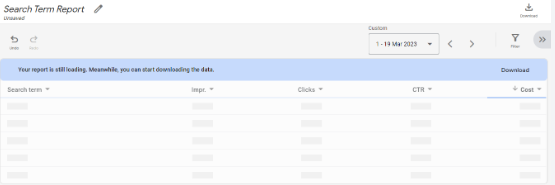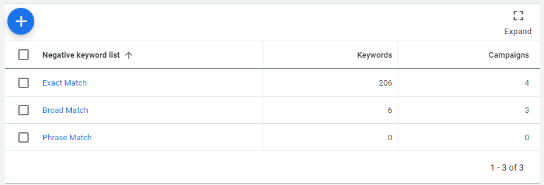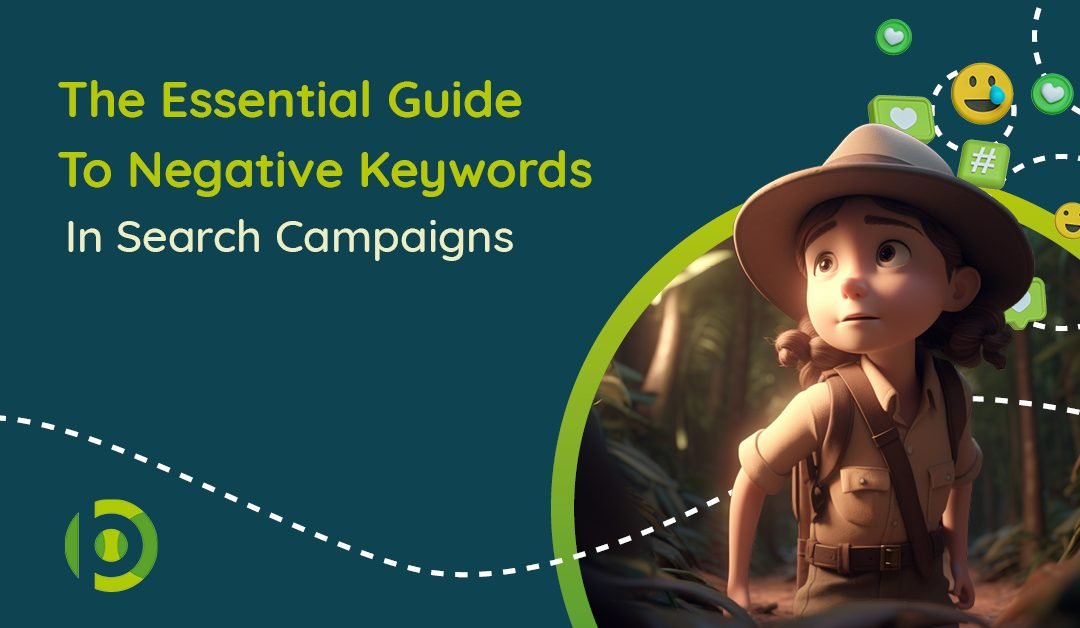Unless you’ve got all the money in the world, you’re going to need to have a negative keyword strategy.
But you already know that, don’t you? Because that’s why you’re here.
You’ve probably gone through your ad accounts and seen all of these irrelevant terms pop up and cost you some serious £££’s. And want to know how best to tackle them without feeling like you’re playing a game of whack-a-mole.
Well, you’re in luck. In this post, we’re going to cover what are negative keywords when you should use them, when you shouldn’t, and some of the best practices around implementing them.
What is a negative keyword?
A negative keyword is a tool you can use to prevent your ads from triggering searches containing specific keywords or phrases. Just like normal keywords, you have 3 options to choose from when it comes to match type. These are:
- Exact – A keyword setting that allows you to exclude your ad for searches of the exact keyword phrase
- Broad – This will exclude any search terms that your keyword is included in, no matter where it appears in it. For example, if you put “Dog” on broad match every word or phrase associated with “Dog” will never appear in your search query list.
- Phrase – A keyword setting that allows you to exclude your ad for searches that include the exact keyword phrase
Why use Negative Keywords
Incorporating a negative keyword strategy into your PPC advertising can have a significant impact on its efficiency and effectiveness. By reaching the right audience, you can drive more qualified traffic to your website, increase conversions, and ultimately enhance your Return on Investment (ROI).
Remember, negative keywords are just one aspect of a successful PPC campaign. To have a well-rounded strategy, you also need effective ad copy, landing pages that convert, and ongoing optimisation and testing.
When to use negative keywords?
You don’t always need to have negative keywords in your account. If you’ve built campaigns purely using exact match types, you’re not going to have too many rogue terms pop up. But in reality, it’s very unlikely that you’ll do that because:
- It would take ages to build all of those accounts out.
- You’re potentially limiting yourself by not allowing Google to discover high-intent, high-performing keywords.
So you’re probably going to have to use negative keywords. There are a couple of times when setting up and managing a campaign that you should be actively utilising negatives:
- Firstly it should be before you go live with your campaign. This starts by you sussing out what areas you don’t want to appear in front of.
- Secondly, you need to create one after the first 2 weeks of activity from a search campaign. This is so that you can remove low-quality/poor-intent keywords from your campaigns.
Best Practices
Since Google allowed negative keywords to be integrated into search campaigns, it has allowed advertisers to streamline where their ads appear and on what search terms. For search, this is pivotal as the keywords are now only half the sum of what brings through quality traffic.
Below we will be addressing the following best practices to utilise negative keywords in search campaigns to produce the highest quality of traffic.
So, how can you effectively incorporate negative keywords into your PPC campaigns? Here are some best practices to improve your search quality from negative keywords and some innovative ways to make sure that your traffic quality is maintained:
Do keyword research before you start to exclude irrelevant terms
Before adding negative keywords, understand the keywords your target audience is searching for. Thorough keyword research helps identify any keywords that may trigger your ads in an irrelevant manner, so you can add them to your negative keyword list.
Tools that we find the best to help with this are Google Ads Keyword Planner, SEM Rush, and Wordstream. These tools are designed to look for keywords based on either the match type or the theme of the keyword. This is why they are great ways to test what potential search terms you may appear in front of.

Exclude keywords by theme
With a campaign, you can exclude keywords by the following themes: gender, location and product type.
So for example, if your product identifies more with men (E.g. Men’s shavers) then you can exclude the opposite to this (Women’s shavers). However, to break it down you will first need to identify what your product is, who it’s aimed at, and then where they are located.
Then you need to work backwards to find who this isn’t aimed at, what the product isn’t, and then where your audience isn’t located. This will allow you to build a negative keyword list based on queries that are closely related to those themes.
To go one step further you can even put your themes on “phrase match” and Google will filter any close variation of these automatically from your search.
Analyse the Search Terms Report
The Search Terms Report shows the terms that trigger your ads. This information helps identify irrelevant keywords that may have been missed, allowing you to add them to your negative keyword list. This report helps continuously improve your PPC campaigns.

Regularly Review and Update Your Negative Keyword List
As your PPC campaigns continue, it’s essential to regularly review and update your negative keyword list to keep it up-to-date and prevent irrelevant searches. Your target audience’s search terms and keywords can change, and your negative keyword list should reflect this.

Consider Different Match Types
When adding negative keywords, consider using different match types, such as phrase match and exact match, to effectively exclude irrelevant searches. Different match types allow you to target your ads more precisely and avoid showing them to those searching for something unrelated to your business. You can even structure your negative keyword list around match types so that you can utilise this strategy.

Conclusion
Negative keywords play a critical role in maximising the efficiency and effectiveness of your search campaigns. By incorporating a negative keyword strategy, you reach the right audience, drive more qualified traffic to your website, and enhance your ROI. So, take the time to research and implement negative keywords in your PPC campaigns for the best results.

